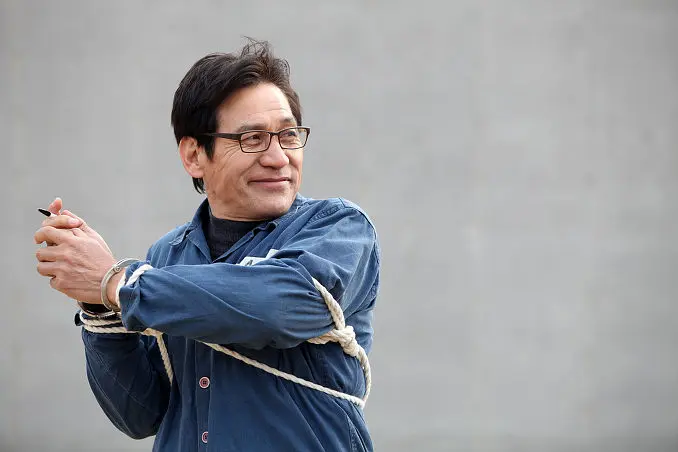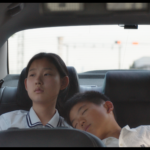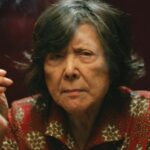London East Asia Film Festival 2023 returns to London with a diverse programme from East and Southeast Asia, including international and UK premieres.
Sarah Goy reviews Unbowed, screening at LEAFF as part of a retrospective strand on director Chung Ji-young, the film depicts the struggle for justice by a former professor wrongfully accused of assault.
A university maths professor singularly takes on the force of Korea’s corrupt judiciary, armed with nothing but a crossbow, a criminal statutes book, and… the power of logic.
Based on a true story, Unbowed is a courtroom drama which follows indicted professor Kim Kyoung-ho (Ahn Sung-ki) in his fight to clear his name. The firestorm starts when Kim unfairly loses his job at his university, as well as his employment tribunal. Disgruntled, he uses a crossbow to threaten the tribunal’s judge, Park Bong-joo (Kim Eung-soo), and is then falsely accused of assault. This ignites a chain of escalating events, where Kim is deemed a “terrorist against the judicial system” and thrust into a high-stakes legal battle.
Living up to the film’s title, Kim embodies an uncompromising, unbowed spirit. He is an absolute stickler for rules, who maintains an unwavering faith in the rule of law and logic. From irritably firing his lawyers, to reprimanding the trial’s judges for interrupting him, to his pedantic insistence on quoting black-letter law, Kim is frustratingly obstinate and self-confident, even when this appears to be to his detriment. At times, this naive stubbornness exasperated me and seemed overly contrived. Midway through the film, concerns are expressed about Kim’s ability to take on a notoriously strict and conservative judge. In response, Kim’s grave declaration – “I’m conservative and my nickname’s bastard” – is so serious and earnest, that it borders on cheesy.

Personally, I enjoyed Kim’s character most during his interactions with his lawyer, Park Jun. (Park Won-sang) A self-described “third-rate lawyer”, Park leads a disorganised and listless life, as he grapples with an unfulfilling career, alcoholism and a nonchalant marriage. In other words, he serves as the perfect foil to the stern and straight-laced Kim. Park lives in a world of healthy cynicism, with a looming awareness that the little man can never truly win. He believes that cases are won through strategic tactics, like rallying press coverage and public support. On the other hand, Kim persists in an overly scrupulous, almost rigidly delusional, faith that cases can be won simply by “being right”, much like a child in an argument. Together, the two share an endearing, somewhat comical tension, as the baffled Park struggles to manage his difficult client both in and out of court. I enjoyed watching their relationship develop from initial bewilderment to mutual respect.
Kim and Park’s struggle is no doubt a testament to the importance of standing your ground and keeping the faith. Yet, this inspirational message is also diluted with a dose of reality – Kim and Park’s refusal to surrender leads them to experience horrific physical and emotional trauma. Indeed, Unbowed paints a sobering picture of the rule of law under fire. It dives deep into issues of cronyism and corruption, which are notoriously prevalent in Korea. The very protectors of the law – the judiciary – are portrayed as cowardly and self-serving villains. Throughout the trial, the prosecutors, and judges blatantly bypass trial procedures and ignore the proper application of the law. This entrenched corruption is best captured in the final court scene, where Kim ardently lays out his defence with comprehensive evidence and infallible logic, only to be thwarted by dismissive and unreasoned “No”s from the judge. The ease at which bureaucratic power can override and blatantly fly in the face of logic and due process was deeply unsettling and thought-provoking.

However, I found myself wishing that the film had developed more worthy opponents of Kim, as the main villains read more like cartoonishly evil and incompetent caricatures. At many times, Kim’s arguments simply render the prosecution and judges spluttering, or silent. Towards the end, the trial plays out more like a total smackdown by Kim than a compelling battle of wits. If the prosecution could have more convincingly matched Kim’s intelligence, this would have made for a much smarter and sharper film.
Furthermore, I felt like the entire film struggled to maintain its balancing act between a smart courtroom drama, a commentary on institutional corruption, and a character study. As a result, the film meanders down many avenues – For example, it briefly teases Kim’s interactions with hardened prison gang members, Park’s romantic tensions with journalist Jang Eun-seo, and Kim’s relationship with his wife and son. Yet, these fascinating glimpses are very much touch-and-go – In the final act, the film seemingly forgets these unresolved sub-plots in favour of focusing on the final trial’s outcome. The result? I was left wondering and waiting, with unsatisfyingly little payoff. This is a pity, because these emotional nuances would have significantly fleshed out and added texture to the characters.

Ultimately, Unbowed is a film that speaks to anyone who has ever experienced injustice and corruption, or simply the pains of bureaucracy. It sets out a very clear but questionably inspirational message – Speak up against injustice and fight for your convictions, no matter the (inevitable and significant) costs.




